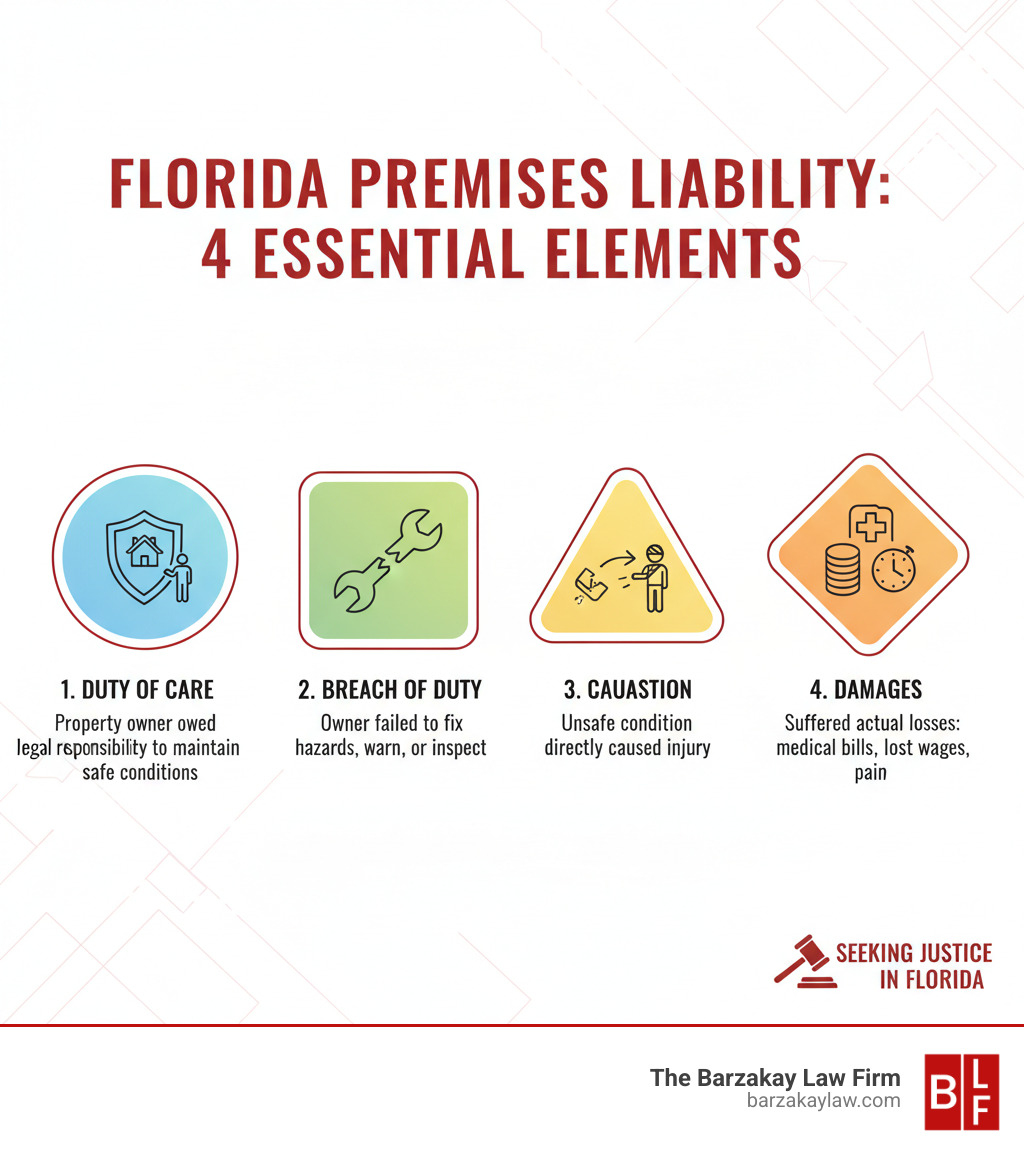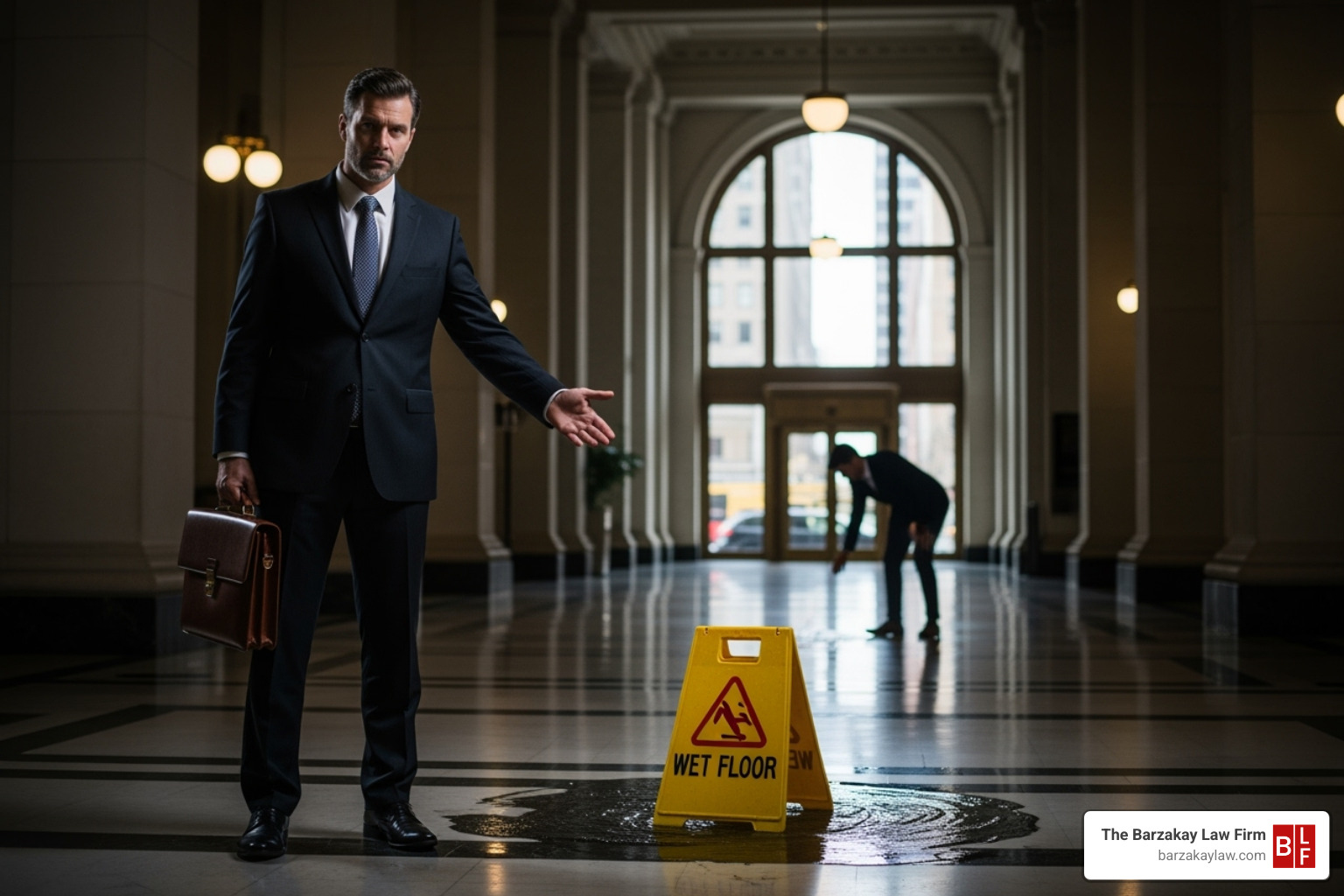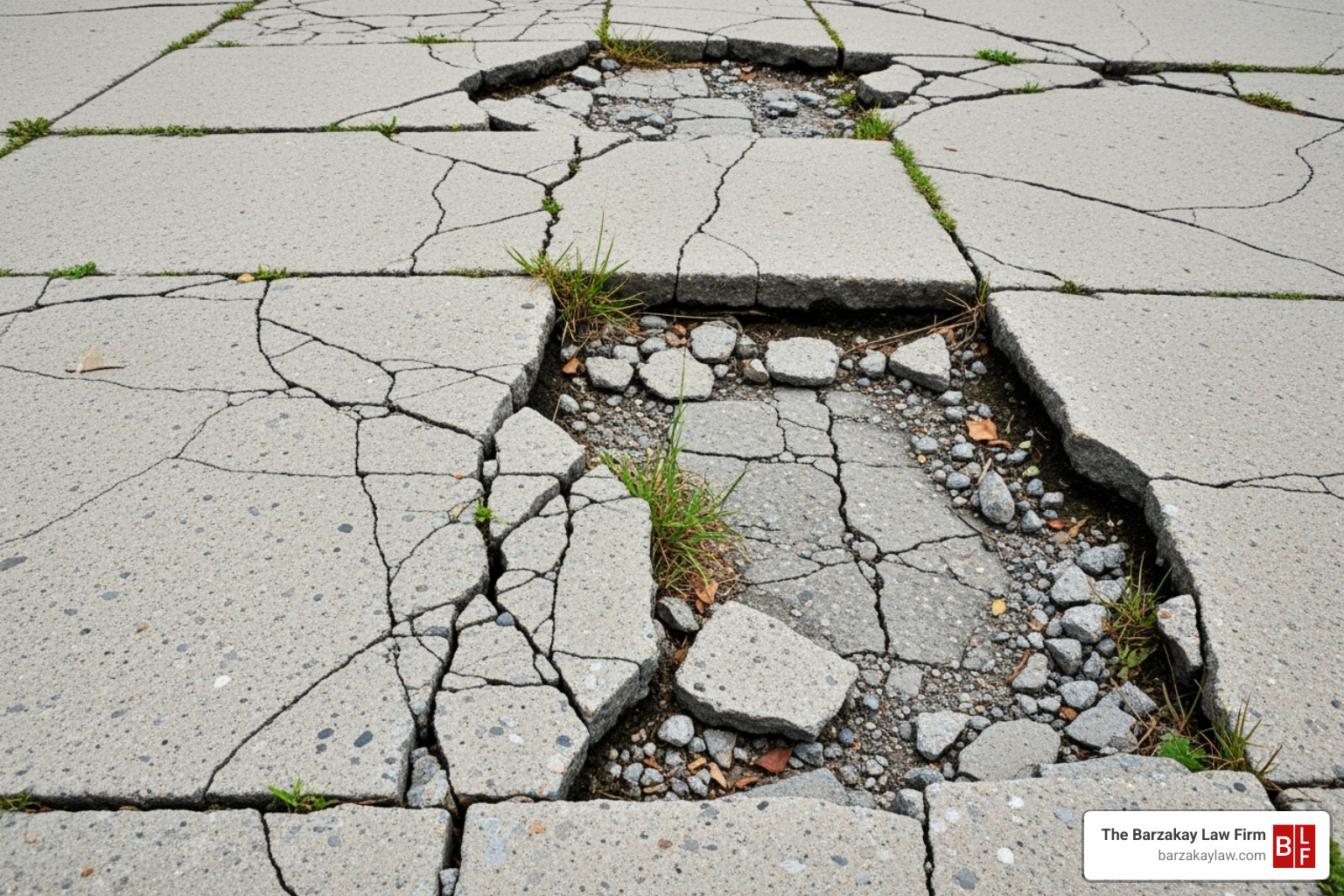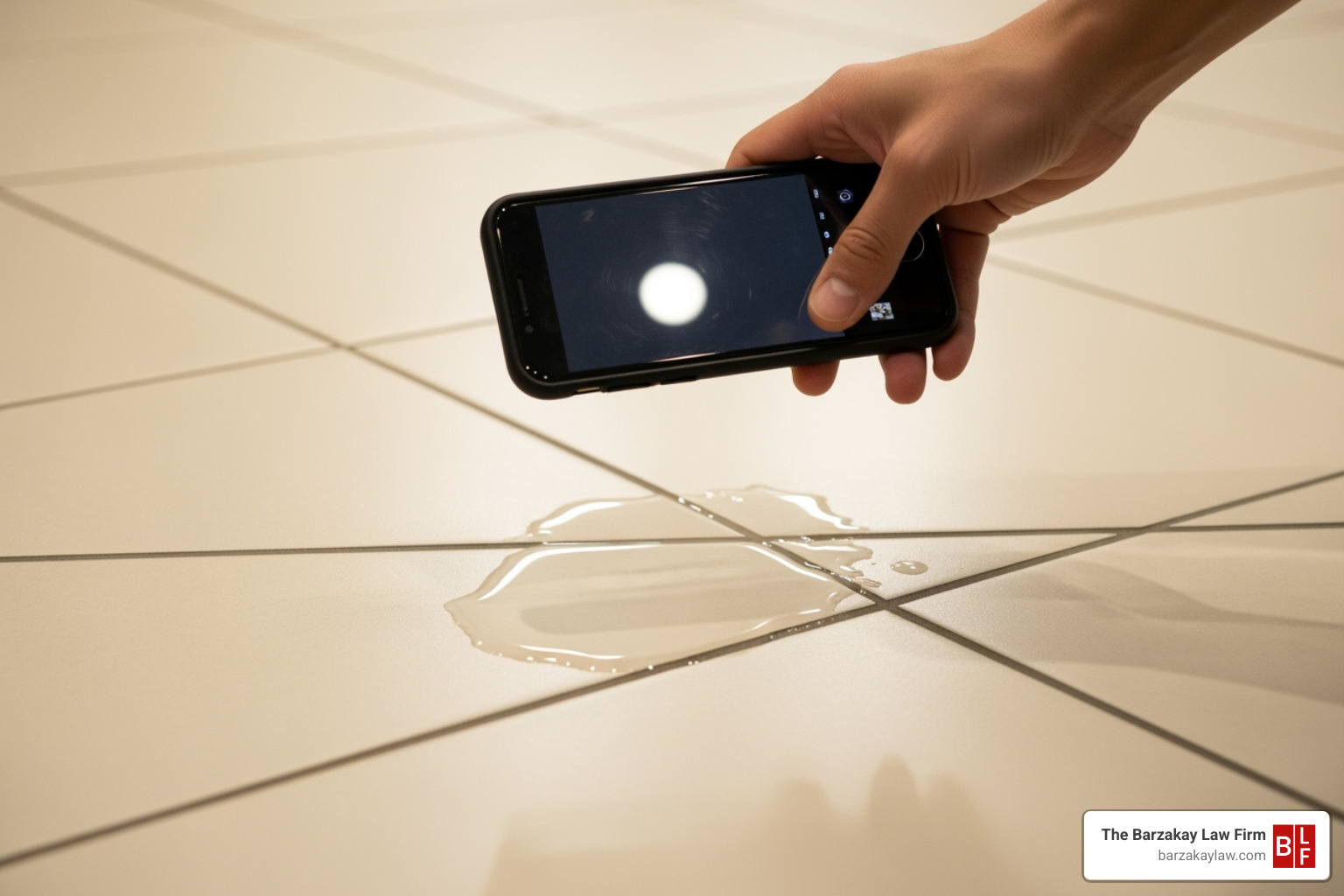Understanding Premises Liability Law in Florida
A premises liability lawyer represents individuals injured on someone else’s property due to unsafe conditions. These attorneys help victims steer complex legal requirements, prove property owner negligence, and secure compensation for medical bills, lost wages, and pain and suffering.
You may need a lawyer for injuries from slip and falls, trip and falls, inadequate security, dog bites, or other dangerous conditions like falling objects or swimming pool accidents. A lawyer will investigate the accident, prove the owner’s negligence, deal with insurance companies, calculate your full damages, and file your claim before Florida’s two-year deadline expires.
Injuries on another’s property can be overwhelming. Medical bills accumulate, you miss work, and property owners often deny responsibility or offer low settlements. Florida law requires property owners to maintain reasonably safe conditions. When they fail, they can be held responsible, but proving negligence is challenging, especially when recovering from serious injuries like bone fractures or traumatic brain injuries.
In South Florida communities like Hollywood, Miami, and Boca Raton, premises liability cases are common. Each case requires thorough investigation and knowledge of Florida’s comparative negligence laws.

This guide explains premises liability law in Florida, helping you understand your rights and how a dedicated premises liability lawyer can help you seek the compensation you deserve.
Understanding Legal Responsibility: The Property Owner’s Duty of Care
When someone is hurt on another’s property, who is responsible? Florida law uses the “duty of care” concept—the legal obligation property owners have to keep their premises reasonably safe for visitors. This means maintaining the property, inspecting for dangers, and warning people about hazards.
However, the level of care owed depends on the visitor’s status. Florida law divides visitors into three categories: invitees, licensees, and trespassers.
An invitee (e.g., a customer in a Miami Beach restaurant) is owed the highest duty of care.
A licensee (e.g., a social guest at a Hollywood home) is owed a moderate duty.
A trespasser (someone entering without permission) is owed the lowest duty.
“Property owner” can also include tenants, property managers, or anyone controlling the property. Foreseeability is also key; owners are responsible for hazards they knew about or should have known about through reasonable inspection.
Commercial vs. Private Property Liability
The type of property affects the owner’s duty. Business owners have a high standard of care. When you enter a store or hotel in Hollywood or Miami, the owner must actively inspect for dangers, fix them promptly, and warn you of potential harm. This means a grocery store must regularly check aisles for spills, and a mall must ensure adequate lighting.
Homeowners have a more relaxed standard for social guests. If you invite friends to your Boca Raton home, you must warn them of known, non-obvious dangers (like a broken step), but you aren’t required to conduct constant safety inspections.
The distinction is crucial in building a case. For more on slip and fall accidents, our guide on Florida Premises Liability Slip Fall Attorneys offers detailed insights.

| Visitor Status | Commercial Property (Invitees) | Private Property (Licensees) | Trespassers (All Properties) |
|---|---|---|---|
| Duty of Care Owed | Highest duty: Actively inspect, fix known/findable hazards, warn of non-obvious dangers. | Moderate duty: Warn of known, non-obvious dangers. No duty to inspect for unknown hazards. | Lowest duty: No willful or wanton injury; warn of known, dangerous conditions if finded. |
| Example | A store must clean up a spill and warn customers. | A homeowner must warn guests about a broken step. | Cannot set traps. If a child trespasses, “attractive nuisance” may apply. |
Special Cases: Municipal and Government Property
Injuries on government property—like a public park in Boca Raton or a cracked sidewalk in Miami—add complexity. Government entities have protections called sovereign immunity, which can limit your ability to sue.
The biggest challenge is the deadline. While most injury cases in Florida have a two-year statute of limitations, claims against government bodies often require a formal notice of claim within six months of the injury. If you miss this deadline, your claim is likely void, regardless of the severity of your injury.
These notice requirements are strict. It is critical to get legal advice immediately if you’re injured on public property to ensure all procedures are met. For guidance on documenting such injuries, see our article on Document An Injury In A Park.
Common Causes and Injuries in Premises Liability Claims
When property owners fail to keep their premises safe, the consequences can be severe. While slip and fall accidents are common in South Florida, many other dangerous conditions can lead to life-changing injuries.

Common causes of premises liability claims include:
- Slip and fall/trip and fall accidents from wet floors, uneven pavement, or debris.
- Inadequate security, leading to assaults or robberies in poorly lit areas or properties with broken locks.
- Poor lighting in stairwells, corridors, or parking lots.
- Broken stairs or railings that can cause catastrophic falls.
- Falling objects from poorly stacked shelves or unsecured fixtures.
- Dog bites and animal attacks where an owner fails to control an aggressive animal.
- Swimming pool accidents due to a lack of proper fencing or supervision.
- Elevator and escalator malfunctions from poor maintenance.
- Exposure to toxic substances like mold or lead paint.
These incidents can cause devastating injuries, such as bone fractures, traumatic brain injuries (TBI), spinal cord injuries, severe cuts, and soft tissue damage. Some victims suffer from chronic pain, disfigurement, or even wrongful death. A premises liability lawyer can help you steer the legal process and fight for the compensation needed for your recovery.
Negligent Security in Hollywood and Miami
In busy areas like Hollywood and Miami, some of the most serious incidents arise from inadequate security. Negligent security claims occur when a property owner fails to provide reasonable measures to protect visitors from foreseeable criminal acts, such as assaults in a poorly lit parking garage or robberies at an apartment complex with broken gates.
If an owner knew or should have known about a risk of crime but did nothing, they can be held liable for resulting injuries. Signs of inadequate security include poor lighting, broken locks, a lack of security guards, or non-working surveillance cameras. A history of prior criminal activity on the property strengthens the owner’s duty to implement protective measures.
These cases require careful investigation into the property’s history and security standards. To learn more, visit our pages on Negligent Security Attorney and Security Negligence in Hollywood.
Why You Need a Premises Liability Lawyer for Your Florida Claim
After an injury on someone else’s property in South Florida, you face physical pain, mounting bills, and lost income. Meanwhile, the property owner’s insurance company aims to pay as little as possible. They may blame you or offer a quick, low settlement that doesn’t cover your actual losses.
This is where a premises liability lawyer makes a difference. Navigating Florida’s premises liability laws is complex. Property owners and their insurers have legal teams working to minimize their liability. Without knowledgeable representation, you are at a disadvantage.
A dedicated lawyer knows how to prove the property owner was negligent, counter common defense tactics, and calculate the full value of your claim—including future care and lost earning capacity. Florida’s statute of limitations gives you only two years to file most claims (and just six months for government property). A lawyer ensures you meet every deadline.
What Does a Premises liability lawyer Do to Build Your Case?
Building a strong premises liability case requires a methodical approach. The process begins with an immediate investigation of the accident scene in Boca Raton, Hollywood, or wherever your injury occurred. We document the hazard before it can be altered.
Evidence collection includes obtaining incident reports, surveillance footage, witness statements, and maintenance logs that can prove the property owner’s negligence. For complex cases, we may work with professionals like engineers or medical practitioners to provide technical testimony that strengthens your claim.
We calculate all your damages—not just current bills, but future medical needs, lost earning capacity, and pain and suffering. We then negotiate with the insurance company from a position of strength. If a fair settlement isn’t offered, we are prepared to file a lawsuit and take your case to trial.
When Should You Contact a Premises liability lawyer?
You should contact a lawyer as soon as possible after your injury.
- Evidence disappears quickly. The hazardous condition may be fixed, and witness memories can fade. The sooner we investigate, the stronger your case.
- Deadlines are strict. You have two years to file most lawsuits in Florida, but sometimes as little as six months for claims against the government. Missing a deadline means losing your right to compensation.
- Insurance adjusters are not on your side. Before giving a recorded statement, speak with a lawyer. Insurers are trained to get you to say things that hurt your claim.
- Don’t accept a settlement without review. Early offers are almost always too low. Once you sign a release, you can’t ask for more money later. Our article on Slip and Fall Legal Advice offers more information.
- When liability is disputed. If the owner blames you, you need a lawyer to prove their negligence.
Most premises liability lawyers work on a contingency fee basis, so you pay nothing unless you win. There is no risk in getting a free consultation.
Building Your Case: Evidence and Compensation
The success of a premises liability case depends on evidence. Without solid proof of the property owner’s negligence, recovering compensation is nearly impossible. We gather multiple types of evidence to build a strong foundation for your claim.

Photographic and video evidence is powerful, capturing the hazardous condition before it’s fixed. We also work to obtain any surveillance footage. Incident reports filed with the property owner create an official record of the event. Witness statements from people who saw what happened add credibility to your account. Your medical records document your injuries and link them to the accident. Proof of lost wages, such as pay stubs and employment records, shows the financial impact. Maintenance and inspection logs can reveal a pattern of neglect. In some cases, testimony from engineers or medical professionals can add weight to your claim by explaining why a structure failed or the long-term impact of your injuries.
What Compensation Can Be Recovered?
Florida law allows you to seek compensation, or “damages,” for your losses. These fall into two categories.
Economic damages are tangible costs with clear dollar amounts, including:
- Medical expenses (past and future), from ambulance rides to surgery and physical therapy.
- Lost income and reduced future earning capacity if your injuries prevent you from working at your previous level.
Non-economic damages compensate for intangible losses, such as:
- Pain and suffering for the physical discomfort and emotional toll of the injury.
- Loss of enjoyment of life for the activities you can no longer participate in.
- Loss of consortium for the impact on your relationship with your spouse.
The value of your claim depends on the severity of your injuries and their impact on your life. For more on the claims process and fees, see our articles on Slip and Fall Injury Claim and Slip and Fall Lawyer Fees.
Factors That Can Affect Your Claim
Several factors can complicate a premises liability claim.
- Florida’s comparative negligence rule: Your compensation can be reduced by your percentage of fault. If you are found more than 50% at fault for the accident, you recover nothing.
- Assumption of risk: The defense may argue you knowingly accepted a danger, though we can counter that a warning was inadequate or you had no other choice.
- Trespassing: Property owners owe a very limited duty to trespassers. However, exceptions exist for children (the “attractive nuisance” doctrine) and “finded” trespassers.
- The “open and obvious” defense: Owners often claim a hazard was so obvious you should have avoided it. We can argue that distractions or poor lighting prevented you from noticing it.
- Proving notice: We must show the owner knew or should have known about the hazard. This is easier to prove if the danger existed for a longer period before your injury.
A premises liability lawyer who understands these nuances can steer these challenges and build a case that counters these common defenses.
Frequently Asked Questions about Premises Liability
When you’re facing a premises liability case, it’s normal to have questions. Here are answers to some of the most common concerns we hear from clients in South Florida.
How long do I have to file a premises liability claim in Florida?
In Florida, you generally have two years from the date of your injury to file a lawsuit. This is known as the statute of limitations. If you miss this deadline, you lose your right to pursue compensation, no matter how strong your case is. The timeline is even shorter for claims against government entities. If you were injured on city, county, or state property, you may have as little as six months to file a formal notice of claim. Because these deadlines are strict, contact a premises liability lawyer right away to protect your rights.
What if the dangerous condition was “open and obvious”?
Property owners often use the “open and obvious” defense, arguing that a hazard was so visible that you should have seen and avoided it. However, a visible hazard does not automatically clear the property owner of responsibility. Florida law recognizes that people can be distracted—by store displays, their children, or simply looking where they are going. Even if a hazard is obvious, the owner may still have a duty to fix it if it poses an unreasonable risk. Under Florida’s comparative fault rule, even if you are found partially at fault, you may still recover damages, though your award will be reduced by your percentage of fault. We know how to challenge this defense and fight to ensure you are not unfairly blamed.
What if I was trespassing when I got hurt?
If you were on someone’s property without permission, the owner owes you a very limited duty of care. Generally, their only obligation is to not intentionally harm you. However, there are important exceptions. If the property owner knew you were on the property, you become a “finded” trespasser, and they have a duty to warn you of known, hidden dangers. The most significant exception is the “attractive nuisance” doctrine, which protects children. If a property has something likely to attract children, like an unfenced swimming pool or construction equipment, the owner can be held liable if a child trespasses and is injured. Because these situations are complex, it’s worth speaking with a lawyer even if you think you were trespassing.
Conclusion: Taking the Next Step for Your Injury Claim
An injury on someone else’s property can disrupt your life with pain, medical bills, and financial stress. You don’t have to handle this alone. Florida law holds property owners accountable when they fail to keep their premises safe for visitors.
At The Barzakay Law Firm, we are dedicated to protecting the rights of people injured in premises liability incidents across South Florida. Whether you were hurt in Hollywood, Miami, Fort Lauderdale, or Boca Raton, we understand the challenges you face. We know how to prove negligence and counter the tactics insurance companies use to deny or reduce claims.
We work on a contingency fee basis, meaning you pay no legal fees unless we win your case. This allows you to seek justice without financial risk.
Time is critical. Evidence can be lost, and strict legal deadlines can bar your claim if you wait too long. The sooner you contact us, the sooner we can begin building your case. We serve communities throughout South Florida, including Hollywood, Miami, Fort Lauderdale, Boca Raton, and Sunrise. If you were injured due to a dangerous condition on someone else’s property, let us handle the legal fight while you focus on your recovery.
Your first step is a free, no-obligation consultation to discuss your case.
Contact us for a free consultation about your slip and fall case
You deserve justice. Let’s get started.
